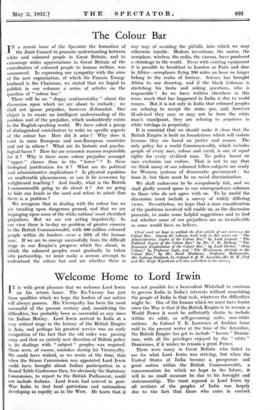The Colour Bar
TN a recent issue of the Spalator the formation of the Joint Council to promote understanding between White and coloured people in Great Britain, and to encourage wider appreciations in Great Britain of the contribution of coloured people to human welfare, was announced. In expressing our sympathy with the aims Of the new organization, of which Sir Francis Young.' husband is the Chairman, we stated that we hoped to publish in our columns a series of articles on the question of "colour bar."
There will be no "sloppy sentimentality" about the discussion upon which we are about to embark ; we shall not ignore prejudice, however ill-founded. Our object is to create an intelligent understanding of the problem and of the prejudice, which undoubtedly exists in the English-speaking world. We have asked a .group of distinguished contributors to write On specific aspects of the colour bar. How did it arise ? Why does it exist in some European and. non-European countries and not in others ? What are its historic and Psycho- logical bases ? How far are economic reasons responsible for it ? Why is there, more -colour prejudice amongst " upper " classes - than in the. " lower " ? Is there biological justification for it ? What are its political and administrative implications ? Is physical repulsion an unalterable phenomenon, or can it be overcome by enlightened teaching ? And finally, what is the British Commonwealth going to do about it ? Are we going to hide our heads in the sand -and refuse to admit that there is a problem ?
We recognize that in dealing with the colour bar we arc treading upon dangerous ground, and that we are impinging upon some of the white nations' most cherished prejudices. But we are not acting impulsively. In our view there is to-day no problem of greater concern to the British Commonwealth, with 400 million coloured people within its borders—over a fifth of the human race. If we are -to emerge successfully from the difficult stage in our Empire's progress which lies ahead, in which the coloured peoples must gradually be taken into partnership, we must make a serious attempt to understand the colour bar and see whether there is any -way of avoiding the pitfalls, into which we may otherwise tumble. Modern inventions, the motor, the aeroplane, wireless, the radio, the cinema, have produced a shrinkage in the world. Even with existing equipment it is possible to breakfast in London or Paris and dine in Africa—aeroplanes flying 200 miles an hour no longer belong to the realm of fantasy. Science has brought Africa to our doorstep, and if the black Colossus is stretching his limbs and asking questions, who is responsible ? As we have written elsewhere in this issue, much that has happened in India is due to world causes. But it is not only in India that coloured peoples are refusing -to accept the -status quo, and, however ill-advised they may -or may not be from the white man's 'standpoint, they are refusing -to acquiesce in white tutelage in perpetuity.
It is essential that we should make it clear that the British Empire is built on foundations which will endure because they are based on justice and reason. The Only policy for a world Commonwealth, which includes people of every race, colour and creed, is one of equal rights for every civilized man. No policy based ott race exclusion can endure. That is not to say that we think many of our coloured fellow-subjects are ready for- Western systems of democratic government ; far from it, but there must be no racial discrimination.
We shall endeavour -to be scrupulously fair, and we shall gladly accord space in our correspondence columns to those who do not agree with -us. To be useful the discussion must include a survey of widely differing views. Nevertheless, we hope that a sane consideration of the problems involved Will enable us, as the discussion proceeds; to make some helpful suggestions and to find out whether some of our prejudices are as ineradicable as some would have us believe.
[Next week we hope to publish the fret article of our series en the Colour Bar. Among the subjects dealt with in this aeries are "The Administrative Aspect of the Colour Bar," by Lord Lugard, The Political Aspect of the Colour Bar," by Mr. J. H. Driberg, "The Economic Explanation of the Colour Bar," by Lord" Skin - Colour," by Professor Lyde, and "The Missionary Attitude to the Colour Bar," by Mr. Basil Matthews. Professor Malinowski, Mr. Lothrop Stoddard, Lt.-Colonel E. ff. W. Lascelles, Mr. H. W . Peet and Mr. Hugh Wyndham will also contribute to the series.]




































 Previous page
Previous page